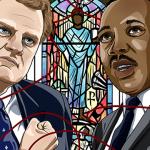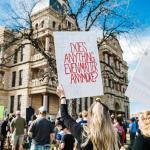I don’t know that one needs to be a trained musician to be a pastor, per se. After all, one has to have natural talent and put in years of hard work to become a good musician—thus the reason most of us preacher types come to depend very heavily on the talents of people like the incredible church musicians we have here atCalvary. (Anybody read about Natalie and the music program in the Post yesterday?)
And, a lot of people don’t know this, but the real power in the church lies—you got it—with the musicians. They are the backbone that sets the tone for service and takes us through the entire worship experience—for good or for bad. And they’re the ones to whom I go every week and say vague things like: “We need a song that’s kind of upbeat here…you know that song, that one we sang that one time that everybody liked, I can’t really remember how it went but it was something about God?” and then they cover their confusion (and perhaps a little bit of disgust) with calmness and somehow, miraculously, come up with just the right song. Such is the complex calling and power of the church musician.
So, no, I don’t think one needs to be a trained musician herself in order to be a pastor. However, I have found that some musical sensibility often comes in handy in the work of the pastor. For example, it’s helpful to know that a groom singing his own rendition of the song “Feelings” in the middle of a wedding service is probably not going to contribute to the worshipful tone of the service.
And, as another example, whether a pastor is one of those amateurs who can play Jingle Bells on the piano or not, it’s always helpful when a pastor knows that there’s a reason Celine Dion gets paid millions of dollars to sing the songs she sings. It’s because nobody else can sing them well, and especially not the dental hygenist who thinks it would be great to bring in the karaoke machine and contribute her own performance of “Because You Loved Me” at her mother’s funeral.
No, you don’t have to be a trained or even talented musician to be a pastor. But, you should know without a doubt that music has power. And despite the fact that we are surrounded with music all day everyday—in the grocery store, on our ipods, in the car on the way to work…the act of corporate singing, especially in a worship setting, is extraordinarily powerful. I mean, just think about it: aside from the National Anthem at a Nats game, how often do you get together with a group of people and sing about something that touches the deepest parts of who you know yourself to be and, especially, how you see yourself in relationship to the God of the universe? It happens here. In worship. And it’s important that the songs we choose and the music we sing contribute to our corporate experience of God. In other words, we steer clear of Celine Dion for most worship occasions.
Our Hebrew text today is the story of a song. You heard the backstory last week, the story of the Israelites, desperate for freedom and relief from their brutal enslavement inEgypt, suddenly finding themselves on the longest road trip ever. They’d packed up what they could carry, left the homes most of them had known all of their lives, placed their hopes in the leadership of Moses, and set out away fromEgypt, toward freedom.
It was a nebulous idea in their heads, no question about that. But it sounded good. FREEDOM. A land where they could make homes of their own. A society in which they could raise their children to be free, practice their faith with no hindrances, cultivate a land that belonged to them and to their children. It was a dream they had had for so long, and with Moses’ direction to finally move out—to leave Egypt forever—it looked like that was finally about to happen.
Things went south real quick, though, as you recall. The Pharaoh, after initially begging them to just leave already, changed his mind. He sent out the entire Egyptian army after the little band of Israelites, determined to reclaim his workforce and subdue them again. That’s when the Israelites found themselves on the edge of the Red Sea, wondering why they’d even bothered to pack up their stuff and cart it all the way out into the middle of nowhere, just to die.
If you read Exodus 15—or if you watched the Disney movie The Prince of Egypt—you’ll know that Moses led the people into the middle of the sea to escape the Egyptian army. Somehow, the waters parted and the people crossed the sea on dry land. And the Egyptian army that followed them was brutally covered by the churning waters, the threat to the people ofIsrael decimated in a second.
The story picks up today on the other side of the Red Sea, after the people had made it all the way across, and after they had watched in horror as the Egyptian army followed right at their heels, and right after that, the horror got deeper as they watched all of those Egyptian soldiers meet a watery, violent death. There they were, standing on the edge of the water, watching stunned and silent as the churning sea swallowed their pursuers.
They’d made it—unbelievably—to the other side. They’d escaped their enemies. They had survived the first step toward freedom and a country of their own. And they didn’t know exactly what one did on such occasions as these.
In, then, stepped the church musician. Okay, I don’t know for sure that Miriam had the role of music leader for the people, but she certainly took the role that day. In the face of punishing oppression, overwhelming fatigue, fear that filled their nostrils and permeated every part of who they were, uncertainty about the future, horror over the trauma they’d just lived through, Miriam raised a song.
Their song.
And in the absence of any Emily-Post-appropriate reaction to the reality of their lives in that moment, what did they do? They sang.
The text says that Miriam, whom we know as a prophet, the sister of Aaron and Moses, one who had been there in the story from the very beginning and was certainly qualified to narrate this next part, picked up her tambourine and stepped away from the crowd. We can tell she went out first, because the text says it was the women who followed next, who picked up their tambourines and joined Miriam’s song. She was the cantor of their experience, jingling her tambourine and raising her voice in song, the only response she could think of at such a time.
“Sing unto the Lord,” her voice rang out over the water, “for He has triumphed gloriously…”. And as the song went on and the story unfolded—“horse and rider thrown into the sea…”, the people joined their voices to hers, rang their tambourines in unison, clapped their hands and lifted their tired and worn out feet to join her…in singing their song.
What else could they do, really? Trapped between a terrifying past and a fear-filled future, they had to give up now…or else call on something bigger—on God—to guide them. And the only way they could think to do that was to join their voices, first tentatively and soft, then, certainly, loud and almost defiant, they sang their song. Together.
Miriam wasn’t the first to sing when a community needed to remember who they were. And she certainly wasn’t the last. Songs are expressions of unity and calls for justice to which we can each add a voice until our differences become incidental in the larger crescendo of a joint cause, a unifying purpose.
In the biblical witness there are songs everywhere—the entire book of Psalms, in fact, is a collection of songs the Hebrew people sang, many together within the context of worship. Mary sang a song that we have adopted as one of our faith’s calls for justice in an unjust world—the Magnificat—and throughout the New Testament there are texts to all different kinds of songs composed and sung by the first church…and if there was any more disparate group of people, it was the first church—filled with Greeks and Jews and people who didn’t even share the same language.
But they could sing.
And sing they did, songs of their faith and their struggle, songs that brought them together and helped them remember that they were part of a story much, much bigger than just their individual selves.
Think about what you know of songs that bring us together, that unify us for the hard work of change. In Tennessee at the Highlander Folk Center, people have been gathering since the 1930s to receive training and support for their struggles. One thing they learn is the art of singing their song—creating and adopting songs that voice their deepest yearnings, that name their political and freedom struggles, that become a kind of “survival art”—the very same thing that Miriam did when she sang her song on the edge of the Red Sea that day.
There are songs that you know and that I know, songs that have shaped our collective conscience as people, songs that have called us to put words to our suffering and resolve to our hopes for justice and change. Songs like “Don’t You Want to Go to Heaven” became the song of Tennessee coal miners, who changed the words of the old hymn to say, “Don’t you want to go to that land where I go? There’ll be no strip mining in that land, no low wages, no exploitation, no black lung, no politicians…don’t you want to go?”
And there were spirituals adopted by slaves longing for freedom: “Nobody Knows the Trouble I’ve Seen” or “Steal Away to Jesus” that became the foundation for great songs of the Civil Rights movement, songs like “Ain’t Gonna Let Nobody Turn Me Around” or “This Little Light of Mine” or “We Shall Overcome”, which laid the ground work for songs of struggle in South Africa, songs like “We Are Marching in the Light of God.”
And massive movements to change society are not the only things that have songs. Our stewardship team for this fall has commandeered Jack Johnson’s song, “Better Together” as our song for stewardship. We’re taking the sentiment that we’re better together, focusing on that as we make our plans for giving in the year ahead, calling on the song to challenge each other in our commitments to stewardship, making the song our song. I wonder if we’ll learn how to sing it?
Then, I mentioned our stewardship campaign to a friend, talking about Jack Johnson’s song, and she interrupted excitedly: “Hey, that’s our song! Don’t you remember? We danced to that song at our wedding!”
Stewardship, weddings, perhaps these don’t have the gravity of, say the Civil Rights struggle, but as people of faith we are engaged in a kind of struggle, too. We struggle everyday to understand this world in which we live, to make sense of the dissonance between what we see all around us and God’s great hope that we catch a glimpse of every once in awhile. Because times get tough and it’s hard to remember what we believe sometimes, we have to do what Miriam did—we have to sing our song, to remember.
See what I mean? We all have a song. The people of Israel, faced with trauma and terror, fear and uncertainty ahead of them, couldn’t really think what the next thing to do might be. So they sang a song.
Mary was a scared teenager who found herself pregnant. She had a powerful experience with God that totally changed the way she viewed the world. In the face of her limited social status and the fear she carried with her, she needed to express her deeply profound thoughts about a God who cared for those who were on the bottom of society’s ladder. So she sang a song.
The first church was a mixed up group of people from everywhere who struggled to find common ground, something they could hang onto as they tried desperately to put words to this new faith they had found. So, they wrote and sang songs.
Slaves longing for freedom, workers desperate for fair wages, protesters longing for a just society, all of them struggling to live in a world that did not reflect their dreams while at the same time desperately longing for a new reality. To name that reality and remember, they sang songs.
So, who are we? We are the people of God at Calvary Baptist Church, gathered on the corner of H and 8th, NW, trying to understand what God is calling us to do in this place and for this time. Like the Israelites, we hang onto this great hope and promise, we see again and again the times that God has turned bitter water into sweet and led us through troubles that seemed insurmountable. We could sing many songs about this: Guide Me O Thou Great Jehovah, Great Is Thy Faithfulness, Blessed Assurance, God of Grace and God of Glory…they are endless, these songs we sing reminding us that we have not been abandoned, that God is not finished with us yet.
And, like every other group of people who gathered together to hope beyond hope for a reality they could not see, we do not know what will come next for us. Is a church this big and this radical a reality for downtown DC? Are there enough people who believe in the transforming work of the Gospel who will join us in this place? In what expressions will we be called upon to live the Gospel, to be agents of God’s transforming grace in this city and in this world? What’s next for us?
We don’t know all of the answers to these questions. But we know that together we hope for a reality that’s different from what we see right now.
And because we wait and hope for a future we can’t yet see, we’ve got to do something to gather us together and remember why we’re here. In the challenge of life together, it’s probably a good idea to take the example of Miriam…to raise our voices together…to remember who we are and who we want to be…and then, to sing our song…. Amen.















